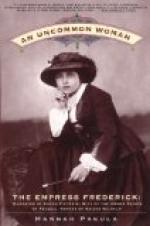“He is past help,” murmured he; “he runs to his ruin, and the voice of warning is unheeded. But how, if he should happen to be right? How, if he with his worldly wisdom and his theory of earthly happiness, should be more conformable to the will of God than we with our virtue and our doctrine of renunciation? Ah, yes, the world is so beautiful, it seems made entirely for pleasure and enjoyment, and yet men wander through it with tearful eyes, disregarding its beauty, and refusing to share its pleasures. All, except man, is free on earth. He alone lies in constraining bands, and his heart bleeds while all creation rejoices. No, no, that cannot be; every individual does what he can to render mankind free and happy, and I also will do my part. God has laid great power in my hand, and I will use it so long as it is mine.”
Thus speaking, the pope left the garden, and hastened up to his study.
“Signor Galiandro,” said he, to his private secretary, “did you not speak to me to-day of several petitions received, in which people begged for dispensations from monk and cloister vows?”
Signor Galiandro smilingly rummaged among a mass of papers that covered the pope’s writing-table.
“In the last four weeks some fifty such petitions have been received. Since your holiness has released several monks and nuns from their vows, all these pious brides of Christ and these consecrated priests seem to have tired of their cloister life, and long to be out in the world again.”
“Whoever does not freely and willingly remain in the house of the Lord, we will not retain them,” said Ganganelli. “Compelled service of the Lord is no service, and the prayer of the lips without the concurrence of the heart is null! Give me all these petitions that I may grant them! The love of the world is awakened in these monks and nuns, and we will give back to the world what belongs to the world. With their resisting and struggling hearts they will make but bad priests and nuns; perhaps it will be better for them to become founders of families. And they who honestly do their duty, equally serve God, whether they are in a cloister or in the bosoms of their families.”
The pope seated himself at his writing-table, and after having carefully examined all the petitions for dispensations, signed his consent, and smilingly handed them back to his secretary.
“I hope we have here made some people happy,” said he, rising, “and therefore it may, perhaps, be allowed us also to be happy in our own way for a quarter of an hour.”
He lightly touched the silver bell suspended over his writing-table, and at the immediately opened door appeared the pleasant and well-nourished face of brother Lorenzo, the Franciscan monk, who performed the whole service of the pope.
“Lorenzo,” said Ganganelli, with a smile, “let us go down into the poultry-yard. You must show me the young chickens of which you told me yesterday. And hear, would it be asking too much to beg of you to bring my dinner into the garden?”




